India Indian music music: 78 rpm discs Indian folk music snake-charmers
by Warren
1 comment
Meta
SiteMeter
Brighter Planet
78 rpm Records of Indian Music: Adu Nath – Been Lahara
This disc contains two short performances by Adu Nath on the been. This “been” is not the rudra vina, but the gourd-mounted double-reed instrument commonly heard in the hands of “snake charmers” all over North India.
The two performances are simply labeled “Been Lahara.” It was obviously a tough instrument to record, as witness the distorted sound. I’m hard-pressed to imagine just who HMV’s marketing division thought was going to buy this disc. Perhaps they were going to try and market it to the tourist trade?
This disc was part of a collection of 78s I acquired serendipitously in the United States.
Anyway, enjoy. I do.
environment Politics: denialists idiots Republican obstructionism scientific consensus
by Warren
leave a comment
Meta
SiteMeter
Brighter Planet
Year 2, Month 7, Day 16: The Changer Things Get, The Samer They Are
The same AP article on the deepening crisis, this time from the June 29 Idaho Press-Tribune:
“The indicators show unequivocally that the world continues to warm,” Thomas R. Karl, director of the National Climatic Data Center, said in releasing the annual State of the Climate report for 2010.
“There is a clear and unmistakable signal from the top of the atmosphere to the depths of the oceans,” added Peter Thorne of the Cooperative Institute for Climate and Satellites, North Carolina State University.
Sent June 30:
While the Earth is certainly, as Dr. Peter Thorne puts it, “sending us a clear and unmistakable signal” about the looming climate catastrophe, the systemic dysfunctionality of our media and politics ensures that those who hear it are in no position to make a difference. When the fossil-fuel industry purchases the allegiance of our legislators and multinational corporations control our news, the end result is political paralysis — something that human civilization can no longer afford. The situational deafness of political opportunists is no longer just an example of institutionalized corruption, but a genuine and pressing danger. That “clear and unmistakable signal” is telling us: the time available to mitigate the disastrous consequences of climate change is rapidly running out. A philosopher might ask: if a window of opportunity slams, but no one hears it, does it make a sound?
Warren Senders
India Indian music music vocalists: 78 rpm discs naat Quawwali Urdu
by Warren
3 comments
Meta
SiteMeter
Brighter Planet
78 rpm Records of Indian Music: Bashir Quaval of Poona
Unless I miss my guess, this still from the 1936 Hindi film Miss Frontier Mail (featuring Fearless Nadia!) is of Bashir Quaval playing harmonium and singing. He is featured on some songs in the movie, and the voice certainly sounds similar to these two naat-s. See the clip here.
Since much of India’s early film industry was based in Pune, the geographical suffix makes sense.
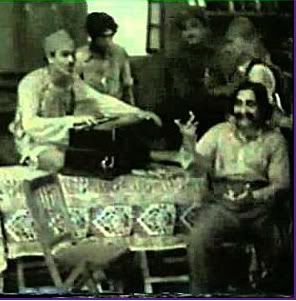
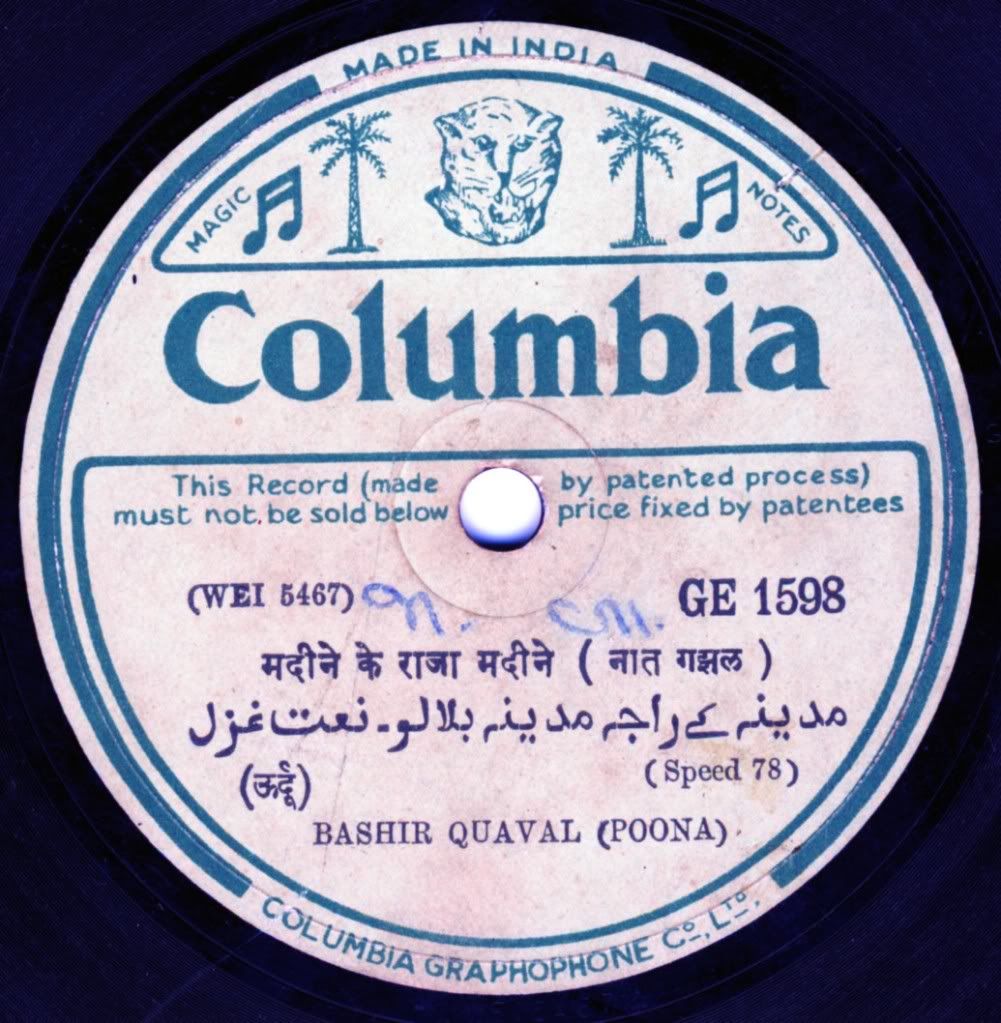
Madine ke raajaa madine
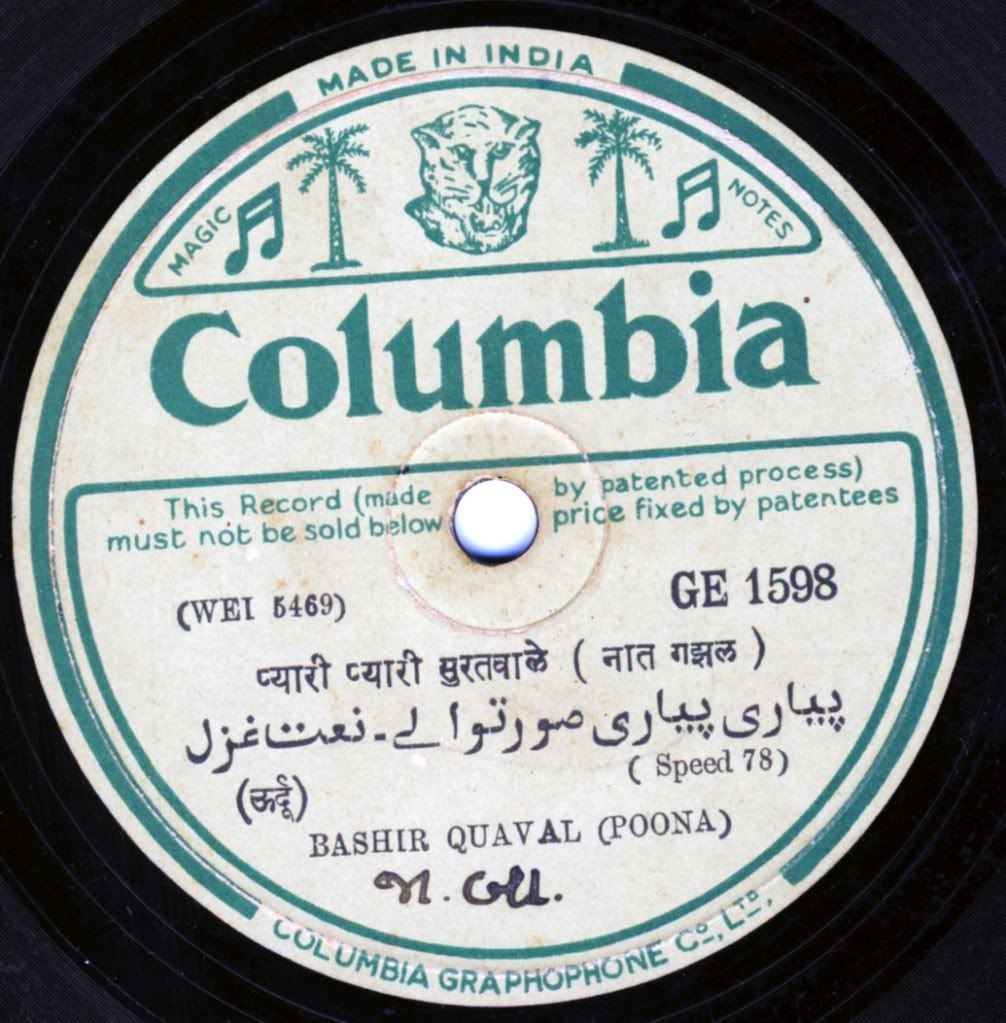
Pyaari pyaari suratwale
environment Politics: denialists idiots NCDC Republican obstructionism Republicans scientific consensus
by Warren
leave a comment
Meta
SiteMeter
Brighter Planet
Year 2, Month 7, Day 15: No News Is Good News
Lots of newspapers are running something about this June 29 report from the National Climate Data Center. Among them is the Fort Wayne News-Sentinel:
WASHINGTON — The world’s climate is not only continuing to warm, it’s adding heat-trapping greenhouse gases faster than in the past, researchers said Tuesday. The global temperature has been warmer than the 20th-century average every month for more than 25 years, they said at a teleconference.
“The indicators show unequivocally that the world continues to warm,” Thomas R. Karl, director of the National Climatic Data Center, said in releasing the annual State of the Climate report for 2010.
The evidence keeps accumulating, and by now it’s way deeper than an anomalous blizzard in Washington, DC. But that won’t stop the climate-change denialists in media and politics. By now their positions are fixed in stone; it would be easier to get all that extra atmospheric CO2 back in the ground than to get the GOP’s anti-science zealots to admit error. During the Bush administration, an un-named official derided the “reality-based community,” saying, “We’re an empire. We make our own reality.” And the current Republican party still clings stubbornly to the notion that inconvenient facts can be ignored, forever if necessary. As the NCDC report shows, pretty soon those facts will be too hot to handle. Eventually, of course, climate denialists will admit the reality of climate change — but America and the world cannot afford to wait any longer. It’s time for them to wake up; the coffee’s burning.
Warren Senders
humor India Indian music music: 78 rpm discs novelty music
by Warren
2 comments
Meta
SiteMeter
Brighter Planet
78 rpm Records of Indian Music: V. Balsara
The keyboardist and composer V. Balsara was responsible for a great many releases of light music, including some film scores, orchestral projects and novelty recordings. These two sides present his harmonium virtuosity with ensemble accompaniment.
“Dance Tune 1”
“Dance Tune 2”
Born in June 1922, Balsara learnt music from his mother Nazamaye, and gave his first solo performance at the age of six with the pedal harmonium, in use in those times, at a packed C. J. Hall in Mumbai.
Barely ten years later, the young lad was assisting famous Music Director Ustad Mustaque Hussain, in a Bombay film production ‘Baadal’.Link
He died in 2005:
V. Balsara, synonymous with the sound of music in the city, died on Thursday afternoon. The legendary pianist and composer was 83.
Balsara, known for his versatility with an array of musical instruments, had been suffering from geriatric problems for the past few months and was undergoing treatment at his nephew’s residence in Ballygunge Park.
Chief minister Buddhadeb Bhattacharjee on Thursday expressed grief over the death of the virtuoso, who had been honoured with a D.Lit by Visva-Bharati, among a number of other awards.
{snip}
A thin, frail man, Balsara always amazed with his verve and energy and went on composing music for Bengali as well as Hindi films till the end.
Though essentially a western composer, Balsara traversed the Indian classical terrain with consummate ease.
{snip}
Balsara would often fuse eastern and western elements of music but was loath to call it fusion. “I merge pure Indian classical music with the most modern rhythms,” Balsara had told Metro during an interview at his Bowbazar house late last year. “In fact, I am allergic to the word fusion,” he had insisted.
Link
He was from all accounts a genuinely nice person and a fine musician. That said, to my compositional ears, Balsara’s work tended to the insipid:
He was not afraid to be simply silly:
Or even sillier:
India Jazz music: 78 rpm discs early jazz
by Warren
2 comments
Meta
SiteMeter
Brighter Planet
78 rpm Records of Indian Music: The Peerless Orchestra
Here are four sides on the Zonophone label from the Peerless Orchestra — a name that has apparently had a significant franchise over the years. As in the case of the Manhattan Jazz Band, these recordings were probably made in England and released in India for the benefit of the British expats.
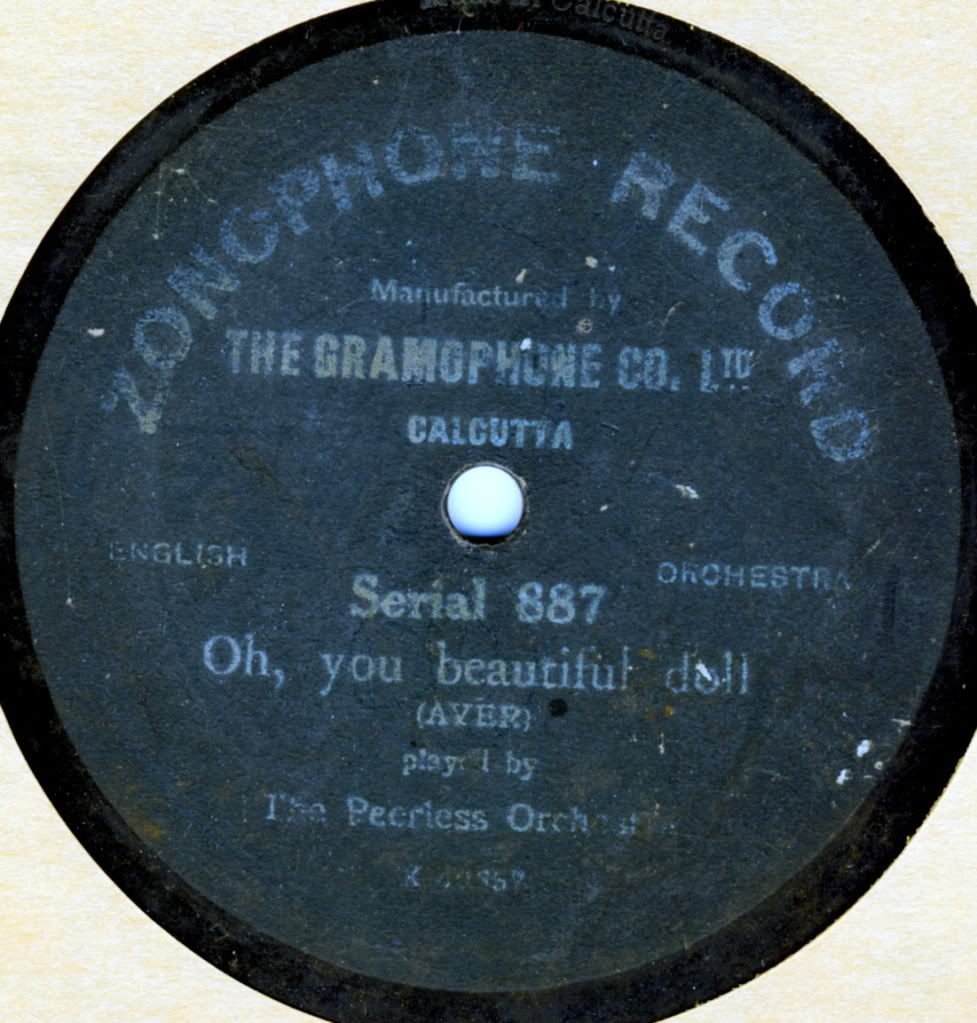
It ain’t Indian music…but it’s certainly evocative of a certain sort of nostalgia, and I will eventually get my entire library of 78s uploaded, so you should get used to some of this stuff now. There’s lots more where that came from.
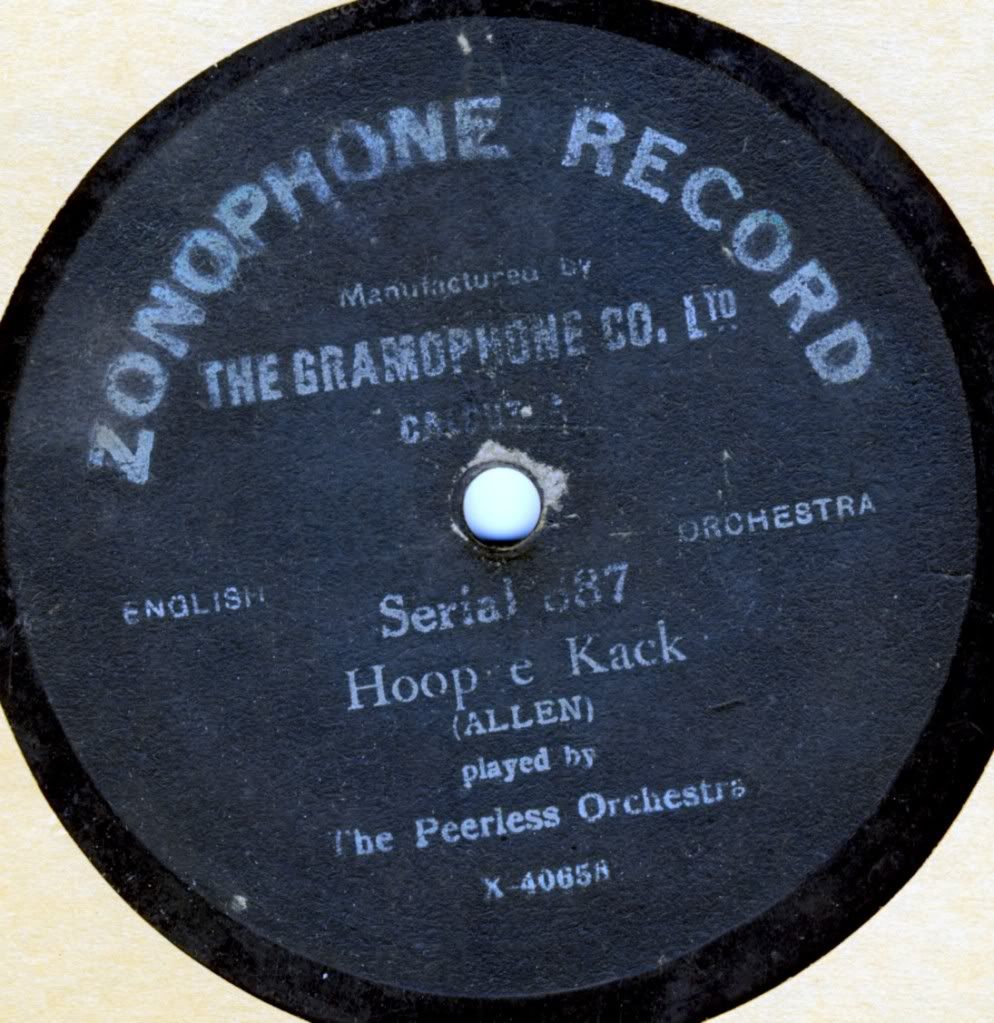
Enjoy.
Oh, You Beautiful Doll
Hoopoe Kack (WTF? SRSLY?)
Miami (A Southern Idyll)
The Horse Trot
environment Politics: corporate irresponsibility denialists EPA Fred Upton
by Warren
leave a comment
Meta
SiteMeter
Brighter Planet
Year 2, Month 7, Day 14: Sustainable Exploitation Is The Way To Go!
The June 28 Times-Record (ME) has a good editorial, titled “What About High Cost Of Unhealthy Air?”
Yeah? What about it?
Actually, it isn’t “we, the people” who get stuck on the cost of keeping our air clean and healthy. Polls consistently show strong public support for the Environmental Protection Agency’s efforts to impose and enforce strict limits on air pollution. A new nationwide bipartisan survey, released on June 16 by the American Lung Association, includes these findings:
— 75 percent of voters support EPA setting stricter limits on smog.
— 65 percent said stricter limits on air pollution will not damage our economic recovery; in fact, 54 percent believe upgraded standards will create more, not fewer, jobs.
— 66 percent said the EPA should set pollution standards, not Congress.
And not only that, but:
In the House, Rep. Fred Upton, R-Mich., chairman of the House Energy and Commerce Committee, successfully pushed through H.R. 910, the Energy Tax Prevention Act, in a 255-172 vote. Opponents renamed it the “Dirty Air Act,” which seems fair enough considering the bill would:
— Block EPA from cutting carbon dioxide and other pollutants from coal-fired power plants, oil refineries and other industries. Opponents rightly point out that coal-fired plants are the largest single-source of global warming pollution in the U.S.
— Override the determination by EPA scientists that global warming pollution poses threats to public health and welfare. Opponents rightly challenge the notion that members of Congress are better informed about climate science than the EPA’s climate scientists.
— Block both the EPA and states from issuing new standards for cleaner vehicles after 2017. Opponents point out that these standards, as well as the 2012-2016 standards, help reduce our reliance on foreign oil and save motorists money at the gas pump.
In the Senate, Upton’s bill fell 10 votes shy of the 60 needed to overcome a filibuster, but many of its provisions turned up in four amendments to an unrelated small business bill (S.493).
It’s a good piece, and triggered these rather testy words, sent June 28:
The ongoing struggle against environmental regulation by giant corporations and their captive politicians is positively surreal in its disregard for the best interests of America and the world. Representative Upton’s attempt to hobble the EPA is based on specious rationalizations, poor science, and a mindset that exalts maximum immediate return on investment and nothing else. But a healthy environment cannot be exploited endlessly; Earth is large, but finite, and the waste products of our industrialized culture have begun to overwhelm the planet’s handling capacity. “The Environment” is not a fictional construct respected only by hippies and scientists; it’s where all of us live. All of us, that is, except multinational corporations, which explains why they find environmental regulations so annoying. It’s not their air that’s unbreathable, or their water that’s increasingly befouled; it’s ours. And other than as a source of short-term profits, what use have they for us?
Warren Senders
environment: climate refugees oceanic acidification oceans plankton whales
by Warren
leave a comment
Meta
SiteMeter
Brighter Planet
Year 2, Month 7, Day 13: May You Live In Interesting Times…
AMSTERDAM, Netherlands — When a 43-foot gray whale was spotted off the Israeli town of Herzliya last year, scientists came to a startling conclusion: It must have wandered across the normally icebound route above Canada, where warm weather briefly opened a clear channel three years earlier.
On a microscopic level, scientists also have found plankton in the North Atlantic where it had not existed for at least 800,000 years.
This will not end well.
Sent June 27:
As strategic thinkers confront the looming reality of global climate change, they are sounding a warning call to all of us: the planet’s atmosphere is warming, and we’re going to face a growing tide of people whose homes and countries have been rendered unlivable. In the aftermath of the torrential rains, parching droughts, catastrophic wildfires, devastating floods and other extreme weather events long predicted by climatologists as consequences of the greenhouse effect, the world’s poor and unlucky will be uprooted, left with little hope and fewer resources. It seems that among those climate refugees are some of Earth’s largest and smallest creatures — like the gray whale spotted off the coast of Israel, and the unexpected plankton discovered by scientists in the Atlantic. Individually, these reports are just mildly interesting anomalies; seen as part of a larger pattern, they indicate that our strategists have grossly underestimated the dangers we’re facing.
Warren Senders
India Indian music music: 78 rpm discs Hindi films
by Warren
3 comments
Meta
SiteMeter
Brighter Planet
78 rpm Records of Indian Music: Master Ibrahim (clarinet)
Once a good song came out in a popular movie, instrumental versions soon followed, often featuring the same orchestration that had been used in the original, with a clarinet, violin, harmonica, or piano substituted for the voice. One highly regarded “version tune” player was the clarinetist Master Ibrahim. Here he renders two songs from the 1943 film Poonji, both originally featuring the vocalist Shamshad Begum.
Ab koi tute hue dil ka sahara:
Gadiwale dupatta udaa jayaare:
Ruskin Bond was a fan of Master Ibrahim’s playing:
I was also fond of the clarinet (turj) playing of an Indian musician, Master Ibrahim, and I had some of his recordings which transported me back to the streets and bazaars of small-town India. Light, lilting and tuneful, I preferred this sort of flute music to the warblings of the more popular songsters.
India Indian music music vocalists: Quawwali Urdu
by Warren
4 comments
Meta
SiteMeter
Brighter Planet
78 rpm Records of Indian Music: Wahidanbai of Agra
In Quawwali performances, a song in praise of the Prophet Mohammed is known as a naat. Wahidanbai of Agra was also heard in Hindi film around this time; unless I’ve got the wrong artist, she was sometimes known as Wahidan Wasti.
Regardless, I enjoy these two naats for her fervent delivery and clear voice production. You will, too.
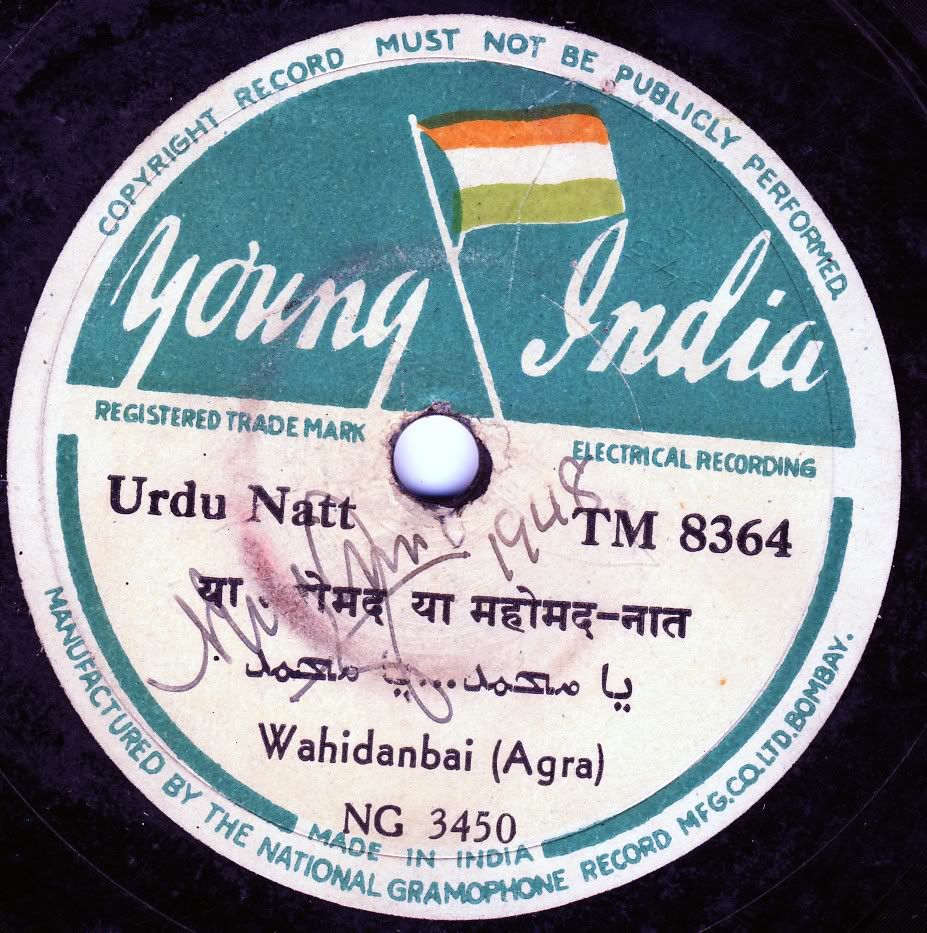
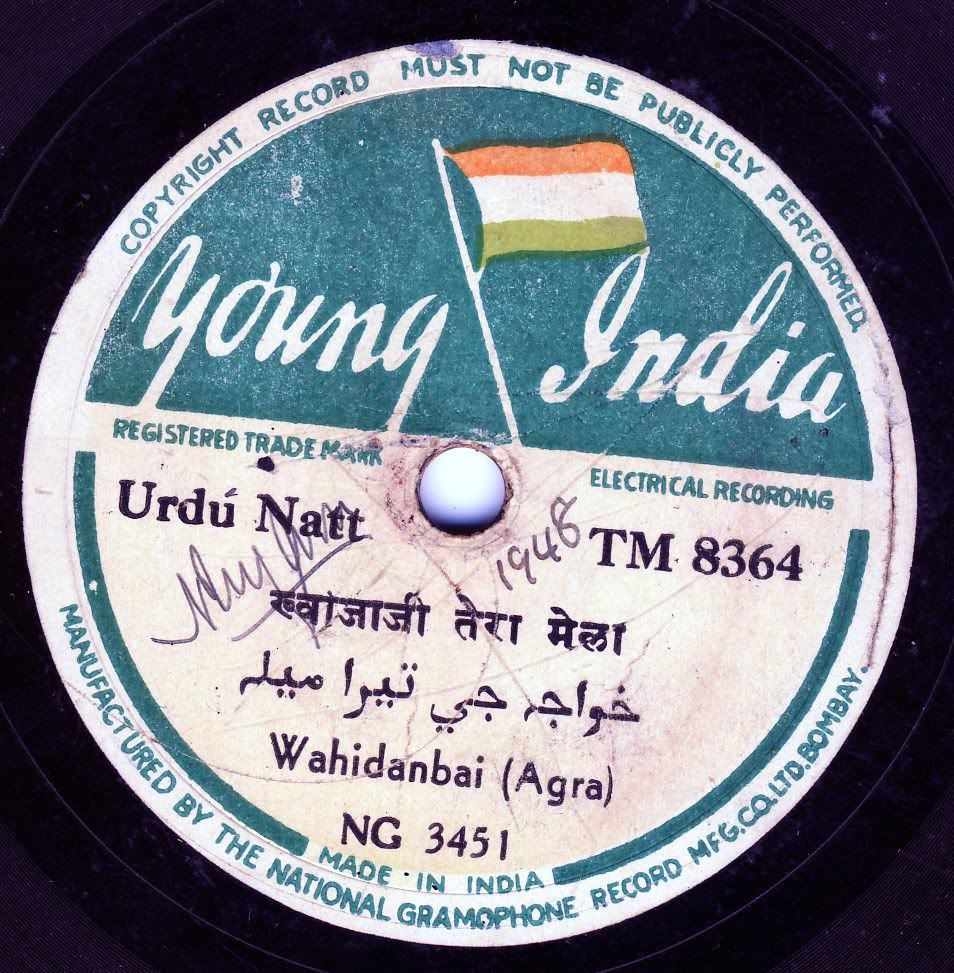
Ya Mohammed Ya Mohammed:
Khwaajaji tera mela:
The “Young India” record label was an attempt at indigenous music production:
During 1930-35, the British and German record manufacturing companies were well established and had a major share of disc manufacturing in India. The ‘Young India’ record label was an ‘indigenous’ effort at record production. The company issued over 10,000 songs on different subjects such as film music, classical music, folk music, publicity and educational material. Mainly amateur and upcoming artists have recorded on this label. The company ceased to function in 1955 so these recordings have never been reissued on audio tapes and CDs. Hence, it is important and relevant to preserve these invaluable recordings and the associated documents.
During 1935-55, the company produced over 10,000 titles on 78-rpm, 10 inch diameter shellac discs with two songs per disc. Each side could be played for over 3/3.5 minutes on spring wound gramophone machines. The recordings of film, popular, classical and folk music were issued. The repertoire covered music from different regions of India and sung in many different languages. During the long tenure of over twenty years, Indian citizens witnessed several important events such as the movement and struggle for freedom, Indian Independence in 1947, World War II and the beginning of the romantic period of independent India. This was also reflected in the records produced. Thus, there are speeches of great leaders, ballads, skits and dialogues on a number of subjects depicting changing social and political situations.

“Young India” records released many recordings of hortatory patriotic speeches. I wish I had a few of them in my collection, but these items are extremely rare.
